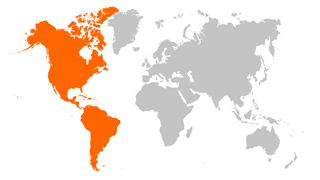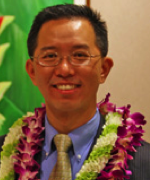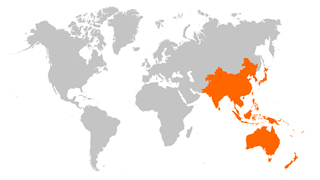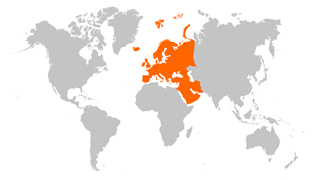To determine the scheduled time in your respective time zone, follow the hyperlink embedded in each respective time shown (this will launch in another window).
Learning to Play to Learn Hawaiian-Style: How Hawaii educators harness gamification & 3D virtual worlds for teaching, learning & service

Presented by: Peter Leong, Professor, University of Hawaiʻi at Mānoa, Honolulu, Hawaiʻi, USA
Description
One of the biggest challenges we face as educators is to engage students in the classroom. Gamification or using game design elements in non-game situations is gaining in popularity. Companies like Nike and Foursquare have embraced gamification to help increase profits. A study conducted by Pew Research Center (2012) found that 53% of respondents felt that there would be significant adoption of gamification by 2020. Can gamification & game-based learning be the change that will awaken student engagement?
This session presents case studies of how Hawaii educators in K-12 schools, a community college and a 4-year college are harnessing gamification, game-based learning and 3D virtual worlds for teaching and learning. Robert Louis Stevenson Middle School created a multiplayer seventh grade Math class called “Knowledge Quest” which is set in medieval times. Heroes of Windward is an interactive, gamified curriculum for IS 103 Introduction to College, at Windward Community College. In the LTEC 643: Educational Technology in Learning in Informal Learning Environments graduate elective course, a hero’s journey monomyth is used to drive the narrative of the gamification where students are time travelers who play pivotal roles in preventing the catastrophe that would ultimately destroy mankind.
At Momilani Elementary School, students participate in Minecraft curriculum-based lessons. Fifth graders were tasked to design themed roller coasters in Minecraft while fourth graders designed a Minecraft zoo. The University of Hawaiʻi at Mānoa’s College of Education’s Department of Learning Design and Technology, and Hawaiian Hope hosted the Minecraft Feast service project aimed to feed the minds of homeless children by immersing them in a curriculum-based Minecraft hands-on lesson while providing a nutritious lunch.
About The Presenter

Peter Leong
Dr. Leong was honored as one of Hawaii’s 2007 top high-technology leaders and received the University of Hawaii Board of Regents’ Medal for Teaching Excellence in 2012. Dr. Leong is the developer of the College of Education’s island in Second Life and organized the first virtual graduation at UHM, which allowed LTEC students both on Oahu and off-island to experience a virtual graduation ceremony in spring 2010. Dr. Leong was the President of the Pan-Pacific Distance Learning Association and the President of the International Division of the Association for Educational Communications and Technology. His research interests include student satisfaction with online learning, faculty support for technology integration, technologies for distance education, gamification & game-based learning and teaching & learning in virtual worlds.
MOOCs and Potentials for Personalized Learning Paths

Presented by: Kumiko Aoki, Professor, Informatics, Open University of Japan, Tokyo, Japan
Description
Massive Open Online Courses (MOOCs), which have recently become a worldwide phenomenon, is now delivered in a variety of formats in many different languages across the globe. Whether it is a cMOOC or xMOOC, or in English, Spanish, or Japanese, it is now undeniable that millions of people learn subject matter ranging from personal hobbies to hard-core sciences through MOOCs. The premises of MOOCs are not only to provide education to the masses for free or at a low cost, but also the possibility of acquiring learning analytics based on the massive data gathered through MOOCs for predicting learning behaviors of individuals. Adaptive MOOCs and personalized MOOCs have been discussed within the framework of a single course so that learners can go through the course depending on their needs and interests or existing knowledge and skills. However, they are not yet widely implemented probably due to the cost of having to create alternative paths within a single course.
In this talk, Dr. Aoki will present the impacts of MOOCs and the possibility of unbundling higher education services, which may foster personalization of individual learning paths throughout people’s lives. This may be possible through artificial intelligence, as learners cannot possess all the information, resources, or capacity to determine their own learning paths. Dr. Aoki will share her reflections and perceptions for personalized learning rather than present facts or research results.
What will learners do if their learning paths are personalized? How will or should the society change as a result of individually personalized learning paths?
About The Presenter

Kumiko Aoki
Dr. Aoki has been heavily involved in the development of first online courses at the Open University of Japan and the leader of its team of instructional designers. She has also served as a member of the governmental committee to evaluate proposals for establishing new distance education programs and universities. Her research interest has always been on the effective use of information and communication technologies and their impact on the practices of teaching and learning in higher education.
Wearable Experience for Knowledge Intensive Training: Learning Methodology and Technology Design

Presented by: Mikhail Forminykh, Project Manager, Europlan UK Ltd, United Kingdom
Associate Professor, Molde University College, Norway
Adjunct Professor, Volga State University of Technology, Russia
Description
This session presents a learning methodology and a technology design that is being developed in the European research-and-innovation project Wearable Experience for Knowledge-Intensive Training (WEKIT). The project aims to improve industrial training with immersive experience by embedding captured expert guidance and technical documentation into the physical space around the learner.
In WEKIT, we use advanced sensors to capture experience as it emerges. Captured guidance provides reference to scale, allowing repeated access to the information asynchronously at the right time and in the right place. Expert guidance is captured with wearable sensors and later re-enacted by trainees with augmented reality creating a believable illusion of master-apprentice knowledge sharing. The captured experience therefore represents a new type of educational media that has properties of carrying both explicit and tacit knowledge. This new media helps to convert experience to knowledge and enable learning by bringing closer the theoretical knowledge and immediate experience, which are traditionally separated.
Tailored content of captured experience can be presented with augmented reality using intuitive and immersive user interfaces. This can have a positive impact on mental processing and memorization, not only adding scaffolds for high performance, but also acting as a safety net preventing potential problems sensed in the environment. The learning activities in WEKIT are enhanced by the trainees reflecting on their own performance, looking back at their behavior and comparing it to that of others.
The goal of the WEKIT methodology is to enable the full cycle of immersive experience by observing an expert, training with and without guidance, and observing one’s performance. The WEKIT technological software-and-hardware platform is a modular and distributed system for capturing and re-enacting experience.
About The Presenter

Mikhail Fominykh
Dr. Fominykh obtained his PhD at the Department of Computer and Information Science at the Norwegian University of Science and Technology (NTNU-Trondheim), and continued as a postdoctoral fellow in the Program for Learning with ICT at the same university. Dr. Fominykh has gained solid experience in the area of technology-enhanced learning through several national and international R&D projects that were funded by the European Union. He has also co-designed and supported several technology courses and training programs. He has published over 45 articles and book chapters and presented his research findings at more than 50 academic conferences.
In 2015, Dr. Fominykh initiated and coordinated a successful 2.7 million euro, grant project in training with Augmented Reality (European Union Horizon 2020 grant No 687669, WEKIT project http://wekit.eu/).
More information about Dr. Fominykh is located at http://mikhailfominykh.com/. He may be contacted by email: mihail.fominyh@gmail.com
